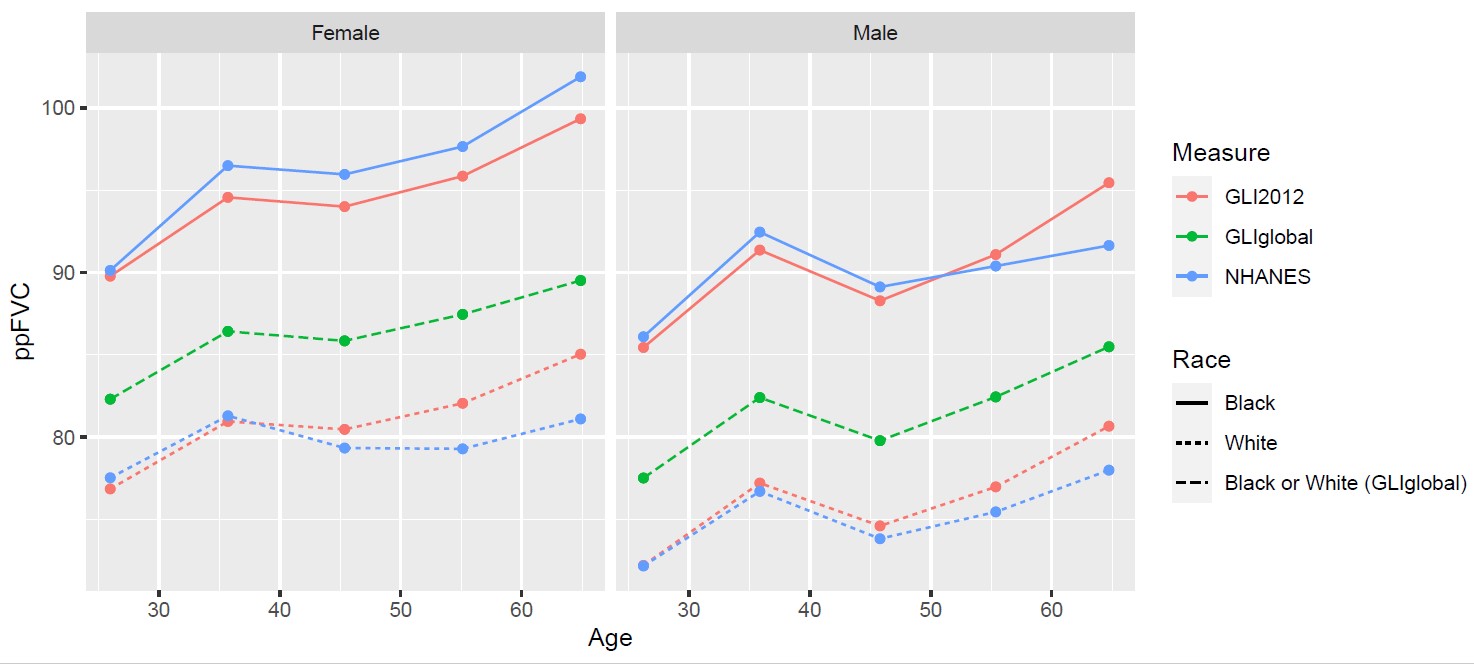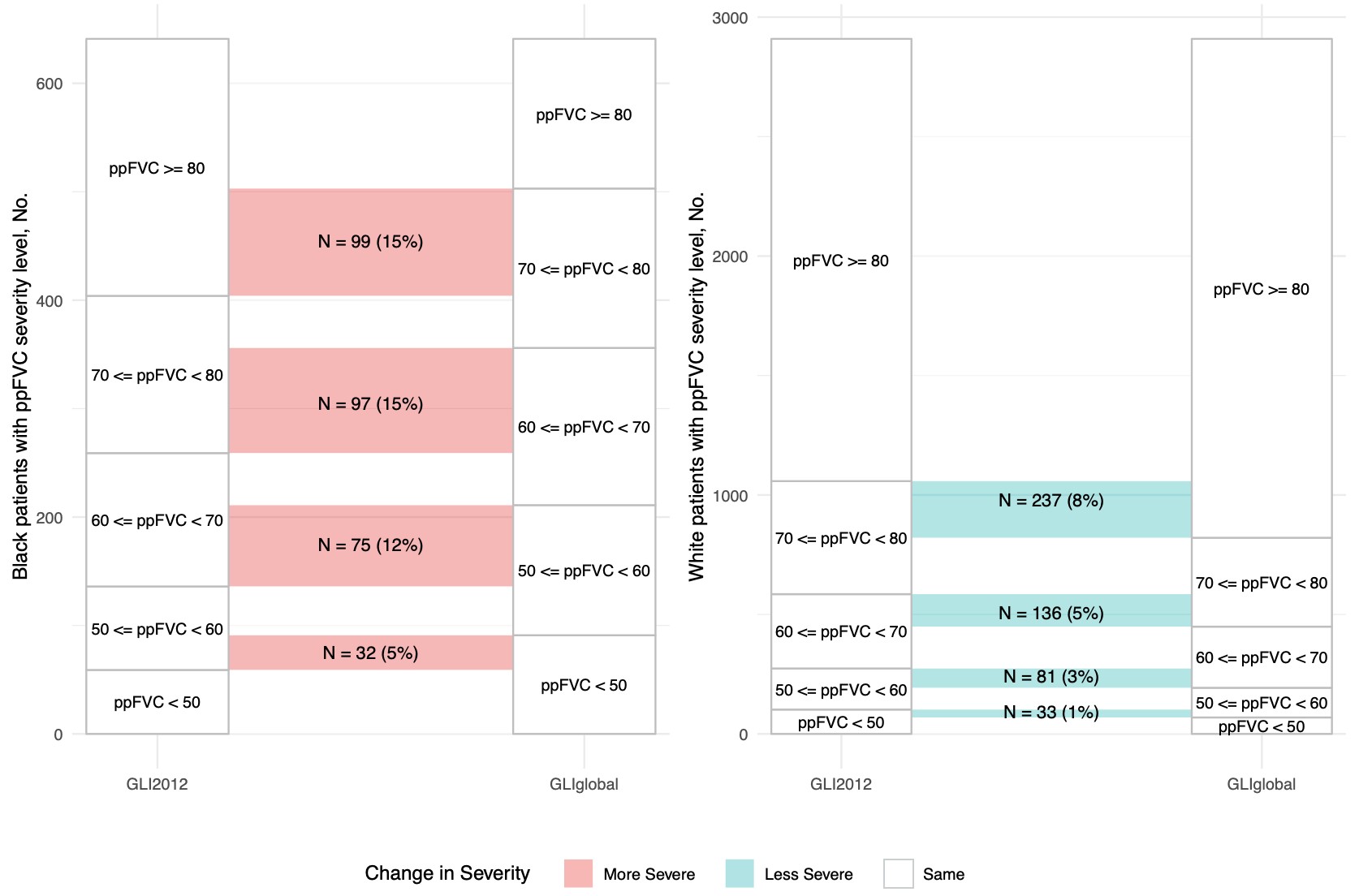Session Information
Date: Sunday, November 17, 2024
Title: Abstracts: Systemic Sclerosis & Related Disorders – Clinical I
Session Type: Abstract Session
Session Time: 1:00PM-2:30PM
Background/Purpose: Black individuals with systemic sclerosis (SSc) have an increased frequency and severity of interstitial lung disease (ILD) as compared to their White counterparts. Pulmonary function tests (PFTs) are critical in the diagnosis and monitoring of ILD among individuals with SSc. PFT reference equations (e.g., National Health and Nutrition Examination Survey [NHANES], Global Lung Initiative 2012 [GLI 2012]) previously used race as a variable for calculating the percent predicted forced vital capacity (ppFVC), a practice without biologic basis Race-neutral equations (referred to as GLI Global) have recently been developed. In this study, we sought to examine how the use of race-specific and race-neutral equations affects the classification of lung function in Black and White patients with SSc.
Methods: Using data from a large, single-center, North American systemic sclerosis cohort, baseline percent predicted FVC (ppFVC) values were calculated for self-identified Black and White patients using race specific (NHANES, GLI 2012) and race neutral (GLI Global) equations. Lung function was classified as normal (≥80% ppFVC) or mild (70-79% ppFVC), moderate (60-69% ppFVC), severe (50-59% ppFVC) or very severe (< 50% ppFVC) restrictive lung disease (RLD). The percentage of Black and White individuals who switched RLD severity classification categories with the use of the race neutral as compared to race specific equations was calculated.
Results: 2909 White patients and 641 Black patients were included in this study. Black individuals had lower baseline FVC (2.4 L vs 3.0 L, p< 0.0001) and diffusing capacity of the lungs for carbon monoxide (12.8 mL/min/mmHg vs 16.0 mL/min/mmHg, p< 0.0001) than White individuals. Figure 1 demonstrates the effect of race-specific and race-neutral equations on calculation of ppFVC across age groups for males and females. For each age group, we observe that race-specific equations systematically overestimate RLD severity for White individuals and underestimate RLD severity for Black individuals. When comparing the race-specific GLI 2012 equations to the race-neutral GLI Global equations, 45% of Black individuals were reclassified as having more severe RLD with the use of race-neutral reference equations (Figure 2). Conversely, 16% of White individuals were reclassified to a less severe RLD category with the use of race-neutral vs race-specific equations.
Conclusion: Changing reference equations can significantly affect the classification of RLD among Black and White individuals with SSc. The use of race-specific reference equations in PFTs may result in systematic underdiagnosis and misclassification of ILD severity among Black individuals with SSc. Importantly, these findings suggest that the use of race-specific PFT reference equations could impede appropriate health care delivery in Black patients with SSc, including initiation of immunosuppression, clinical trial eligibility and referral for lung transplantation.
To cite this abstract in AMA style:
Kuchinad K, Wallwork R, Lammi M, Mecoli C, Paik J, Wigley F, Wise R, Hummers L, Shah A, Kim J. Pulmonary Function Test Reference Equations May Drive Inequitable Classification of Restrictive Lung Disease Severity in Systemic Sclerosis [abstract]. Arthritis Rheumatol. 2024; 76 (suppl 9). https://acrabstracts.org/abstract/pulmonary-function-test-reference-equations-may-drive-inequitable-classification-of-restrictive-lung-disease-severity-in-systemic-sclerosis/. Accessed .« Back to ACR Convergence 2024
ACR Meeting Abstracts - https://acrabstracts.org/abstract/pulmonary-function-test-reference-equations-may-drive-inequitable-classification-of-restrictive-lung-disease-severity-in-systemic-sclerosis/


